外研版英语七年级下册Module 11 Body language 讲义
文档属性
| 名称 | 外研版英语七年级下册Module 11 Body language 讲义 |
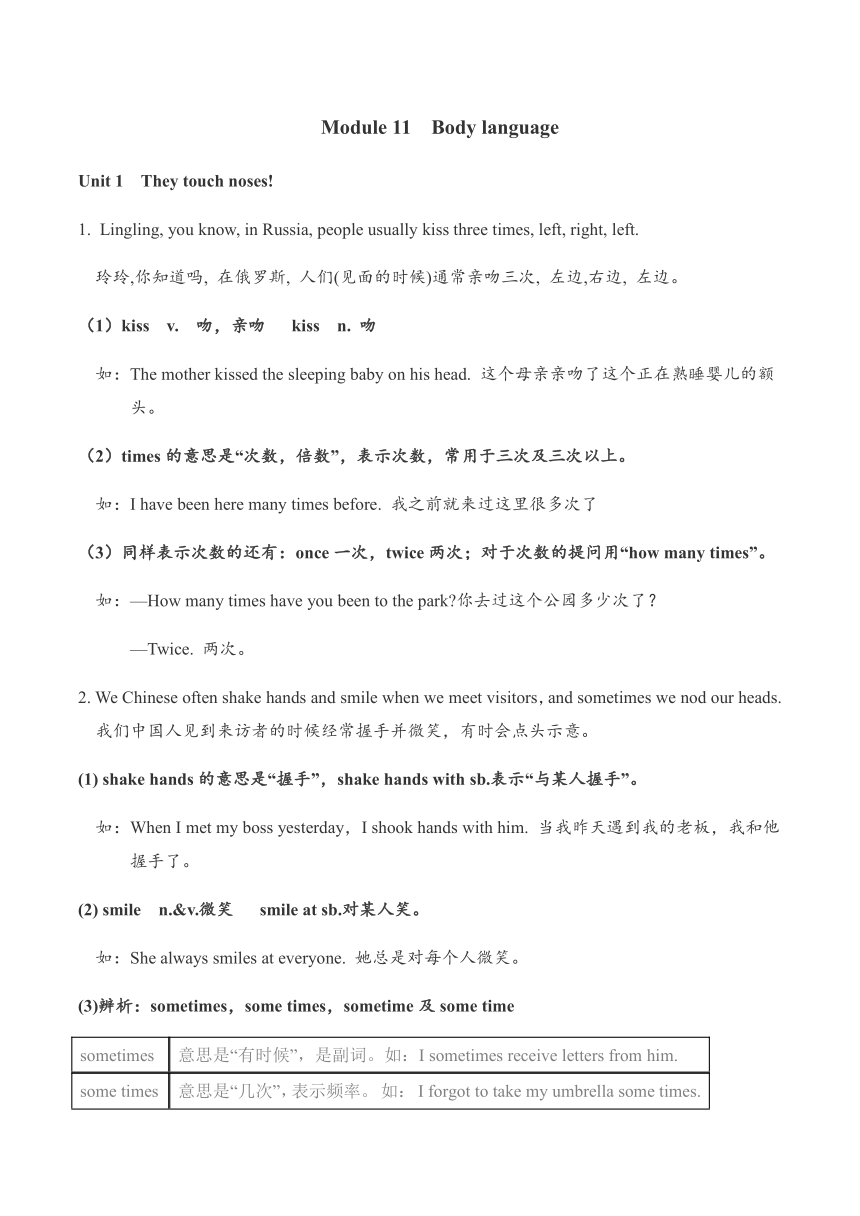
|
|
| 格式 | zip | ||
| 文件大小 | 317.0KB | ||
| 资源类型 | 教案 | ||
| 版本资源 | 外研版 | ||
| 科目 | 英语 | ||
| 更新时间 | 2020-06-08 00:00:00 | ||
图片预览

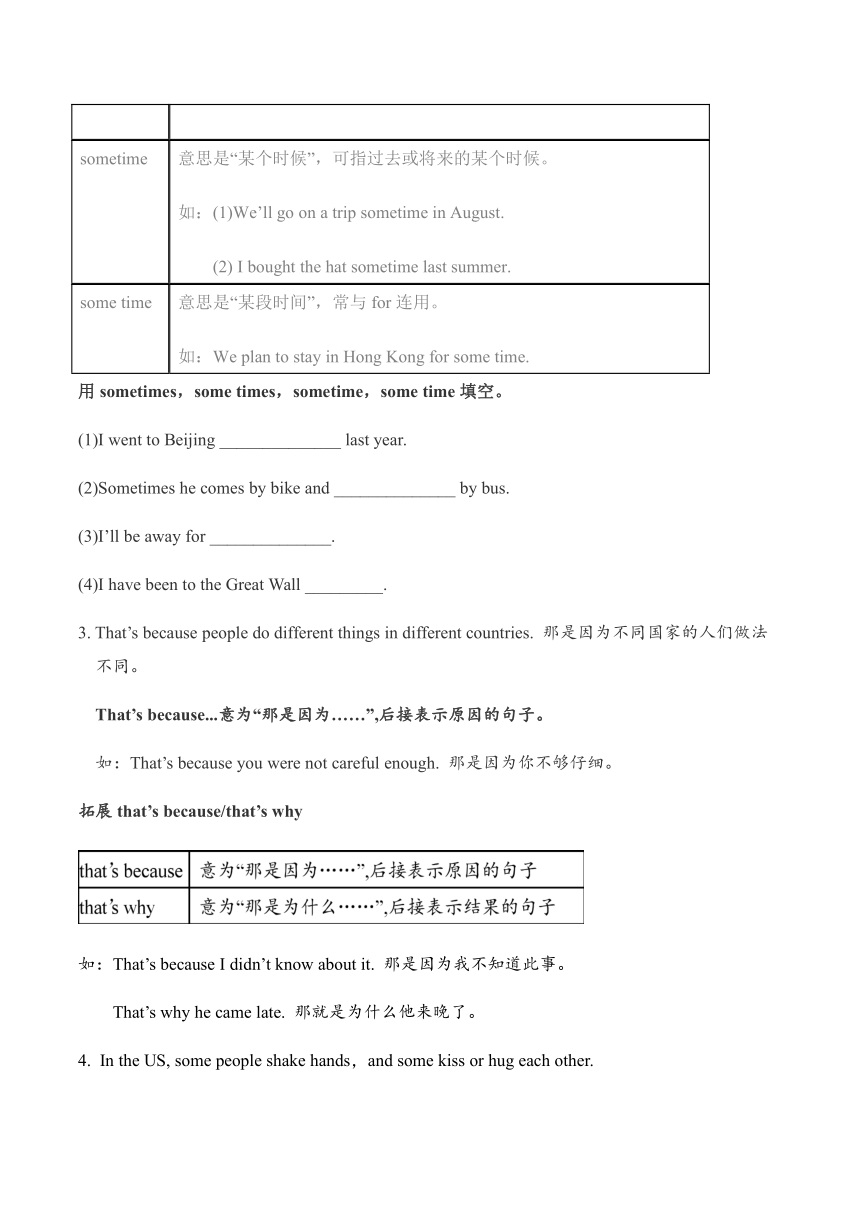
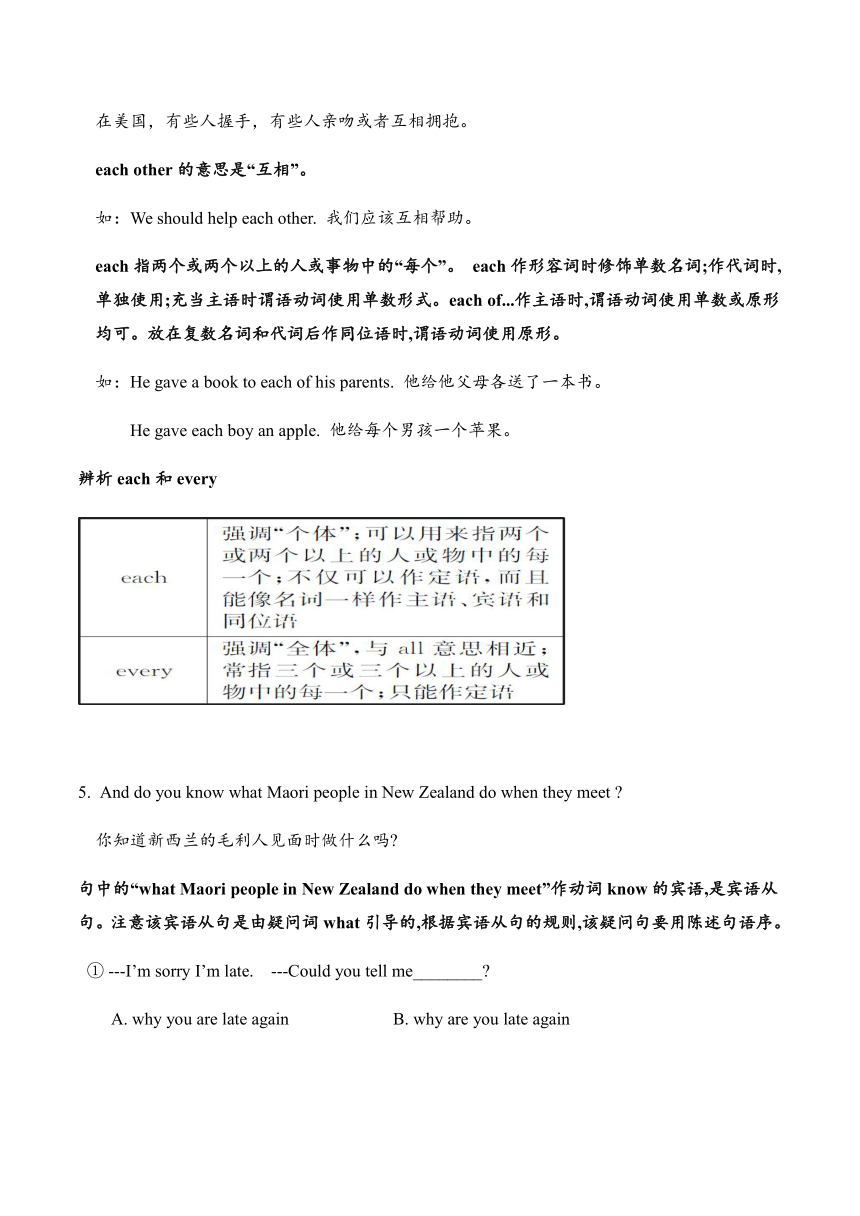
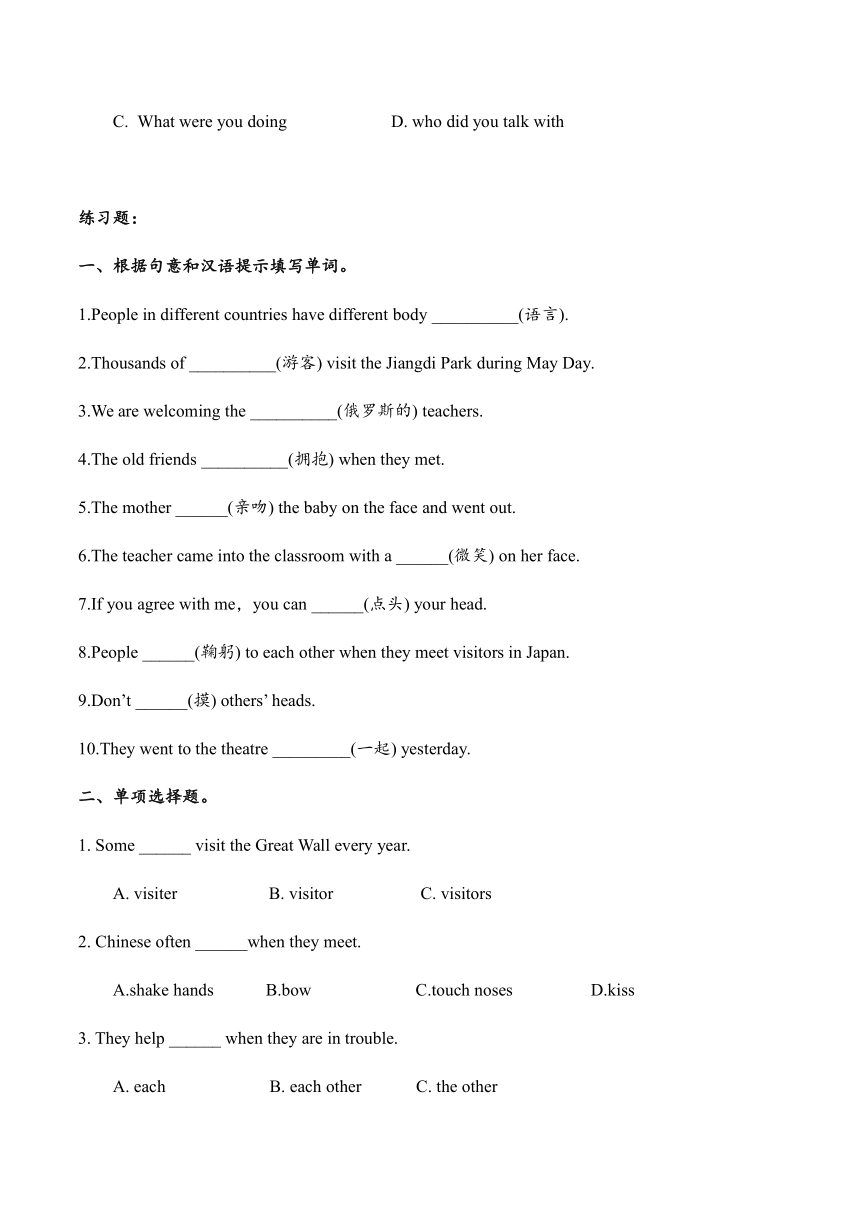
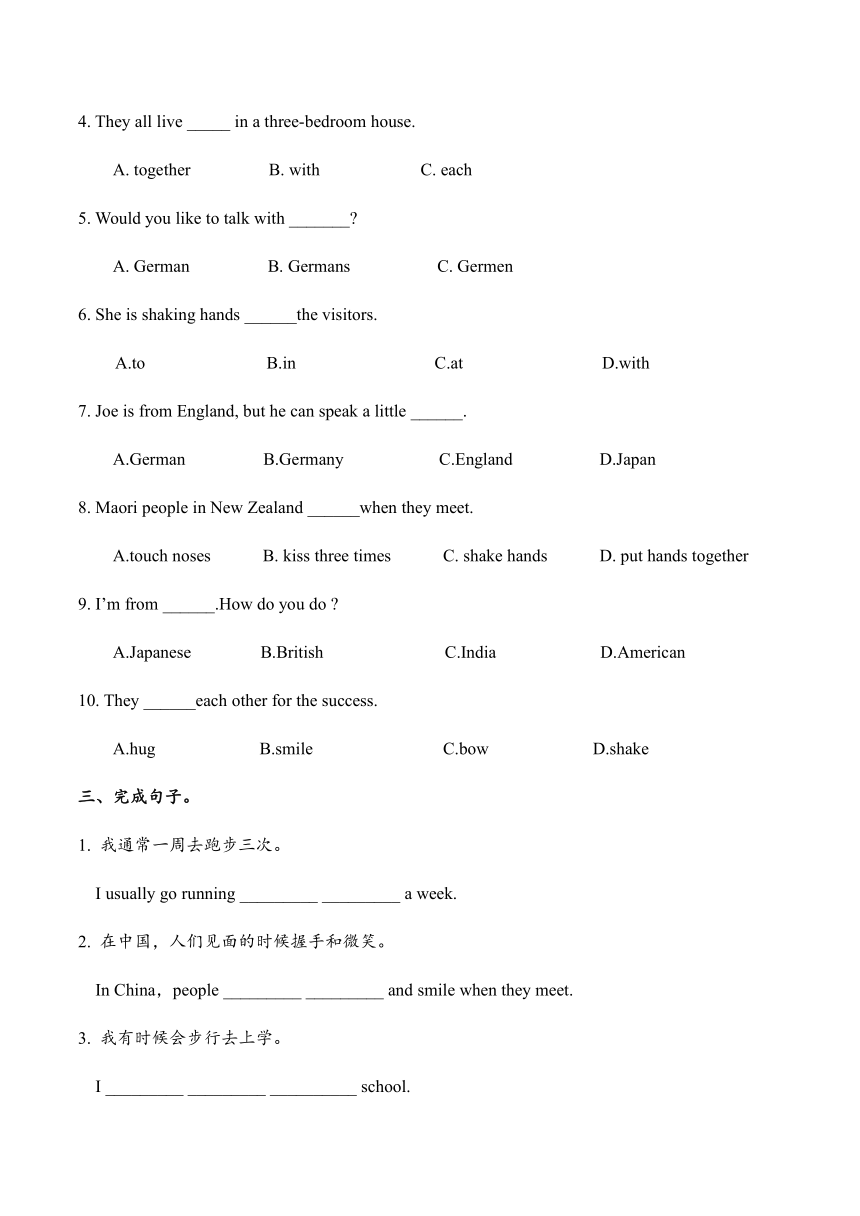
文档简介
Module
11
Body
language
Unit
1
They
touch
noses!
1.
Lingling,
you
know,
in
Russia,
people
usually
kiss
three
times,
left,
right,
left.
玲玲,你知道吗,
在俄罗斯,
人们(见面的时候)通常亲吻三次,
左边,右边,
左边。
(1)kiss
v.
吻,亲吻
kiss
n.
吻
如:The
mother
kissed
the
sleeping
baby
on
his
head.
这个母亲亲吻了这个正在熟睡婴儿的额头。
(2)times的意思是“次数,倍数”,表示次数,常用于三次及三次以上。
如:I
have
been
here
many
times
before.
我之前就来过这里很多次了
(3)同样表示次数的还有:once一次,twice两次;对于次数的提问用“how
many
times”。
如:—How
many
times
have
you
been
to
the
park?你去过这个公园多少次了?
—Twice.
两次。
2.
We
Chinese
often
shake
hands
and
smile
when
we
meet
visitors,and
sometimes
we
nod
our
heads.我们中国人见到来访者的时候经常握手并微笑,有时会点头示意。
(1)
shake
hands的意思是“握手”,shake
hands
with
sb.表示“与某人握手”。
如:When
I
met
my
boss
yesterday,I
shook
hands
with
him.
当我昨天遇到我的老板,我和他握手了。
(2)
smile
n.&v.微笑
smile
at
sb.对某人笑。
如:She
always
smiles
at
everyone.
她总是对每个人微笑。
(3)辨析:sometimes,some
times,sometime及some
time
sometimes
意思是“有时候”,是副词。如:I?sometimes?receive?letters?from?him.
some?times??
意思是“几次”,表示频率。
如:
I?forgot?to?take?my?umbrella?some?times.
sometime
意思是“某个时候”,可指过去或将来的某个时候。如:(1)We’ll?go?on?a?trip?sometime?in?August.(2)?I?bought?the?hat?sometime?last?summer.
some?time
意思是“某段时间”,常与for连用。如:We?plan?to?stay?in?Hong?Kong?for?some?time.
用sometimes,some
times,sometime,some
time填空。
(1)I
went
to
Beijing
______________
last
year.
(2)Sometimes
he
comes
by
bike
and
______________
by
bus.
(3)I’ll
be
away
for
______________.
(4)I
have
been
to
the
Great
Wall
_________.
3.
That’s
because
people
do
different
things
in
different
countries.
那是因为不同国家的人们做法不同。
That’s
because...意为“那是因为……”,后接表示原因的句子。
如:That’s
because
you
were
not
careful
enough.
那是因为你不够仔细。
拓展that’s
because/that’s
why
如:That’s
because
I
didn’t
know
about
it.
那是因为我不知道此事。
That’s
why
he
came
late.
那就是为什么他来晚了。
4.
In
the
US,
some
people
shake
hands,and
some
kiss
or
hug
each
other.
在美国,有些人握手,有些人亲吻或者互相拥抱。
each
other的意思是“互相”。
如:We
should
help
each
other.
我们应该互相帮助。
each指两个或两个以上的人或事物中的“每个”。
each作形容词时修饰单数名词;作代词时,单独使用;充当主语时谓语动词使用单数形式。each
of...作主语时,谓语动词使用单数或原形均可。放在复数名词和代词后作同位语时,谓语动词使用原形。
如:He
gave
a
book
to
each
of
his
parents.
他给他父母各送了一本书。
He
gave
each
boy
an
apple.
他给每个男孩一个苹果。
辨析each和every
5.
And
do
you
know
what
Maori
people
in
New
Zealand
do
when
they
meet
?
你知道新西兰的毛利人见面时做什么吗?
句中的“what
Maori
people
in
New
Zealand
do
when
they
meet”作动词know的宾语,是宾语从句。注意该宾语从句是由疑问词what引导的,根据宾语从句的规则,该疑问句要用陈述句语序。
①
---I’m
sorry
I’m
late.
---Could
you
tell
me________?
A.
why
you
are
late
again
B.
why
are
you
late
again
C.
What
were
you
doing
D.
who
did
you
talk
with
练习题:
一、根据句意和汉语提示填写单词。
1.People
in
different
countries
have
different
body
__________(语言).
2.Thousands
of
__________(游客)
visit
the
Jiangdi
Park
during
May
Day.
3.We
are
welcoming
the
__________(俄罗斯的)
teachers.
4.The
old
friends
__________(拥抱)
when
they
met.
5.The
mother
______(亲吻)
the
baby
on
the
face
and
went
out.
6.The
teacher
came
into
the
classroom
with
a
______(微笑)
on
her
face.
7.If
you
agree
with
me,you
can
______(点头)
your
head.
8.People
______(鞠躬)
to
each
other
when
they
meet
visitors
in
Japan.
9.Don’t
______(摸)
others’
heads.
10.They
went
to
the
theatre
_________(一起)
yesterday.
二、单项选择题。
1.
Some
______
visit
the
Great
Wall
every
year.
A.
visiter
B.
visitor
C.
visitors
2.
Chinese
often
______when
they
meet.
A.shake
hands
B.bow
C.touch
noses
D.kiss
3.
They
help
______
when
they
are
in
trouble.
A.
each
B.
each
other
C.
the
other
4.
They
all
live
_____
in
a
three-bedroom
house.
A.
together
B.
with
C.
each
5.
Would
you
like
to
talk
with
_______?
A.
German
B.
Germans
C.
Germen
6.
She
is
shaking
hands
______the
visitors.
A.to
B.in
C.at
D.with
7.
Joe
is
from
England,
but
he
can
speak
a
little
______.
A.German
B.Germany
C.England
D.Japan
8.
Maori
people
in
New
Zealand
______when
they
meet.
A.touch
noses
B.
kiss
three
times
C.
shake
hands
D.
put
hands
together
9.
I’m
from
______.How
do
you
do
?
A.Japanese
B.British
C.India
D.American
10.
They
______each
other
for
the
success.
A.hug
B.smile
C.bow
D.shake
三、完成句子。
1.
我通常一周去跑步三次。
I
usually
go
running
_________
_________
a
week.
2.
在中国,人们见面的时候握手和微笑。
In
China,people
_________
_________
and
smile
when
they
meet.
3.
我有时候会步行去上学。
I
_________
_________
__________
school.
4.
遇到困难的时候我们应该互相帮助。
We
should
help
_________
_________
when
we’re
in
trouble.
5.
他们触摸鼻子真有趣。
It’s
very
funny
that
they
________
________.
Unit
2
Here
are
some
ways
to
welcome
them.
1.
Here
are
some
ways
to
welcome
them.
这里是一些欢迎他们的方式。
肯定陈述句中,
这种“here”经常置于句首。主语若为名词,
应引起倒装;
主语若为人称代词,
则“主谓”要用正常语序。这种提前主要是为了强调。
如:
Here
are
some
apples。(相当于Some
apples
are
here.)这有一些苹果。
—
Where’s
my
watch
?
—
Is
it
in
your
bag?
—
No,
it
isn’t.
Oh,
here
it
is.
(—
It
is
here.
)
It’s
in
my
pencil-box.
用“There
be
+主语+here”句型。
Here
is
an
English
book.
=
There
is
an
English
book
here.
=
An
English
book
is
here.
Some
ways
to
do
sth.=some
ways
of
doing
sth.
做…的方法
①There
are
many
ways
of
shopping.
=______________________________.
2.
How
about
touching
people?
Chinese
girls
often
walk
arm
in
arm
with
their
friends.
那么关于身体接触呢?中国女孩子经常和朋友臂挽臂地走在一起。
(1)How
about
doing
sth.?
相当于What
about
doing
sth.?
表示“做某事怎么样”。
如:How
about
going
swimming?
去游泳怎么样?
(2)
arm
in
arm表示“臂挽臂地”。
如:They
walked
along
the
beach
arm
in
arm.
他们臂挽臂地沿着海滩走着。
拓展:hand
in
hand
手挽手
如:I
saw
them
walk
hand
in
hand
last
weekend.
我上周末看见他们手挽手地散步。
shoulder
to
shoulder
肩并肩
3.
South
Americans
sometimes
hold
your
arm
when
they
talk
to
you,
so
you
can’t
move
away!
南美人和你交谈时,有时会抓着你的胳膊,所以你就走不开了!
(1)hold
握住,抓住,过去式是held。
如:The
mother
held
the
baby
in
her
arm.
那位母亲把婴儿抱在怀里。
Can
you
hold
these
books
for
me
?
你能帮我拿着这些书吗?
(2)talk
to
sb.(=talk
with
sb.)与某人交谈,
talk
about
sth.谈论某事。
(3)move
away搬走,离开。
如:Please
move
the
big
box
away.
请把这个大箱子搬走。
拓展:
如:We
moved
to
Beijing
last
year.
去年我们搬到了北京。
①
My
head
teacher
wanted
to____________________me.
班主任想和我谈一谈。
②
My
best
friend_________________________
last
month.
我最好的朋友上个月搬走了。
4.
But
in
Britain
many
people
don’t
like
other
people
to
touch
them
at
all.
但是在英国许多人根本不喜欢其他人碰他们。
not
at
all
一点也不,无论如何都不,用于疑问句和否定句,表示强调。
如:They’ve
done
nothing
at
all.
他们什么也没做。
They
obviously
weren’t
at
all
happy.
他们显然一点儿都不高兴。
5.
In
some
places,it
isn’t
polite
to
look
at
people
when
you
talk,but
in
other
countries
it
isn’t
polite
to
look
somewhere
else.在一些地方,交谈时看着对方是不礼貌的,但在其他一些国家,(交谈时)看别的地方是不礼貌的。
(1)It
is+adj.+
for
sb.to
do
sth.意为“某人做某事是怎么样的”。It是这个句型的形式主语,真正的主语是后面的不定式短语。
(2)polite形是容词,意为“礼貌的”,其反义词为impolite或rude。
常用结构:be
polite
to
do
sth.。
(3)somewhere是副词,意为“某处,某个地方”,通常用于肯定句。形容词修饰somewhere时,应放在somewhere后面。
①It
is
important
to
______________
strangers.
对陌生人有礼貌是很重要的。
②I
want
to
go
_______________
to
take
a
vacation.
我想去一个凉爽的地方度假。
6.
That’s
easy,wave
to
say
goodbye.
But
be
careful!In
Greece,it’s
not
at
all
polite!
In
fact,it’s
very
rude!
那很简单,挥手告别。但是要小心!在希腊,这一点儿也不礼貌!事实上,那很粗鲁!
(1)wave意为“挥手,招手”;wave
to
sb.意为“向某人挥手”。
(2)be
careful意为“小心,当心”,相当于watch
out,look
out,
take
care。
(3)not
at
all意为“一点也不,根本不”。
(4)in
fact意为“事实上”。fact是名词,意为“事实,细节”。
in
fact
=
in
actual
fact
=
as
a
matter
of
fact
事实上,实际上
(5)rude是形容词,意为“粗鲁的”,其副词形式是rudely,名词形式为rudeness。
be
rude
to
sb.意为“对某人无礼,对某人粗鲁”。
练习题:
一、根据句意和汉语提示填写单词或短语。
1.The
boy
wants
more
________(个人的)
space.
2.
Mary
is
________(挥动)
her
right
arm
to
say
goodbye.
3.
People
in
different
countries
use
different
______(身体)
language
when
they
meet.
4.
It’s
______(粗鲁的)
to
shout
at
people.
5.
My
leg
was
hurt,and
I
can’t
______(移动)
now.
6.
There
will
be
some
___________(外国人)
visiting
our
school
this
Friday.
7.
It’s
______(礼貌的)
to
talk
with
others
quietly
in
public.
8.
The
box
is
too
heavy.I
can’t
______(举起)
it
up.
9.
The
shoes
are
too
big
for
my
______(脚).
10.The
body
language
in
________(英国)
is
different
from
that
in
the
US.
11.
—
Do
you
like
the
Japanese
food
?
—
_______________.
(一点也不)
12.
They
are
very
good
friends.
They
always
walk
_______________
(臂挽臂地)
when
they
are
together.
13.
You
know
what?
____________
(事实上),
you
are
right.
I
need
to
drop
the
idea
at
once.
二、单项填空。
1._________is
easy________her
to
learn
English.
A.
It;
of
B.
It;
for
C.
That;
for
D.
That;
of
2.
What
about__________
shopping
with
me,
Kate?
A.
go
B.
to
go
C.
going
D.
goes
3.
In
fact,
it’s
______to
point
at
people.
A.rude
B.polite
C.interesting
D.exciting
4.
It’s
not
good
to
look
______else
when
we
talk.
A.anywhere
B.somewhere
C.everywhere
D.nowhere
5.
He
______a
hand
to
attract
her
attention(注意力).
A.moved
B.waved
C.took
D.cut
6.
As
I
grow
up,I
need
more
______space.
A.own
B.alone
C.myself
D.personal
7.
In
______,
he
is
afraid
of
making
a
speech
in
public.
A.time
B.case
C.fact
D.front
of
8.
There
are
five
people
in
the
car.
There
is
no
______for
you.
A.spaces
B.space
C.place
D.rooms
9.
Please
take
it
easy!
______nervous(紧张的)!
A.Don’t
be
B.Don’t
C.Be
not
D.Not
10.
______can
you
see
in
the
picture?
A.What
else
B.When
else
C.Something
else
D.Else
what
11.
He
left
the
office
just
now
without
saying
goodbye
______me.
A.to
B.at
C.for
D.with
12.
It
isn’t
polite
______
to
others
with
your
mouth
full.
A.to
talk
B.talk
C.talking
D.to
talking
三、完成句子。
1.
去旅游怎么样?_________________________taking
a
trip
?
2.
妈妈想要和她儿子谈一谈。
The
mother
would
like
to_________________________
her
son.
3.
这里是一些欢迎外国学生的方式。Here
are______________
to
welcome
the_______________.
4.
在中东你可以和他们站得很近。You
can
stand______________________people
in
Middle
East.
5.
那很简单,直接说再见就可以了。_________________________.Just
to
say
goodbye
is
OK.
Unit
3 Language
in
use
1.You
cannot
bring
food
or
drink
into
the
lab.
你不能把食物或饮料带入实验室。
bring作动词用,意为“带来”,其过去式为brought,常构成短语:bring
sb.sth.=bring
sth.to
sb.意为“给某人带来某物”;bring
up
意为“养育”。
拓展:bring,take,carry与get的用法辨析:
①What
did
he_______here
?
A.
bring
B.
take
C.
carry
D.
get
2.
Is
it
all
right
to
wave
goodbye
in
Greece
?
在希腊挥手再见可以吗?
句中all
right意为“好;行;可以”。
拓展right/all
right/That’s
all
right.
①---Let’s
go
and
ask
him.
---_________.
A.
All
right
B.
Right
C.
That’s
right
D.
That’s
all
right
3.
stand
in
line
“排队,站成一排”。
如:Everywhere
I
went,
I
had
to
stand
in
line.我去任何地方,我不得不排队。
4.
hold
on
to
sth.
“紧紧抓住”。
如:He
held
on
to
my
hands
and
talked
with
me
for
an
hour.
他紧紧抓住了我的手和我谈了一个小时。
5.
point
at
“指向”。如:It’s
rude
to
point
your
fingers
at
people.
把你的手指指着别人是不礼貌的。
语法专项:
祈使句
定义:祈使句用来表达叮嘱、劝告、希望、禁止、警告、请求、建议或命令等。祈使句最常用来表达命令,因此又叫做命令句。
如:Go
and
wash
your
hands.
快去洗手。
(命令)
Be
quiet,
please.
请安静。
(请求)
Be
kind
to
our
sister.
要对我们的妹妹友善。
(劝告)
Watch
your
steps.
走路小心。
(警告)
No
littering.
不要乱扔垃圾。
(禁止)
Don’t
forget
to
take
an
umbrella.
不要忘了带雨伞。
(叮嘱)
1.
祈使句的特点。
(1)祈使句一般没有主语,说话的对象都是第二人称“你”或“你们”,可理解为省略了主语you.
(2)以动词原形开头,无时态和数的变化;
(3)祈使句的否定形式可以在动词原形前加don’t.
2.
祈使句的类型。
(1)肯定句型
①Do型。
句型结构:实义动词原形(+宾语+其他).
如:Listen!
听!
Close
the
door,please.
请关上门。
②Be型。
句型结构:Be动词+表语
(+其他).
如:Be
quiet.安静。
③Let型。句型结构:Let+宾语+动词原形(+其他).
如:Let
me
help
you.让我帮你吧。
(2)否定形式
①Don’t型。
句型结构:Don’t
+动词原形(+其他).
如:Don’t
worry.不要担心。
②No
型。
句型结构:
No+
动词的-ing形式/名词复数。
如:
No
smoking.禁止吸烟。
No
photos.禁止拍照。
一、单项填空。
(
)1.
______parking.
A.Not
B.No
C.Don’t
D.Must
(
)2.
Cindy,______to
be
here
at
8
o’clock.
A.be
sure
B.is
sure
C.will
be
sure
D.is
sure
that
(
)3.
Mary,______here;
everybody
else,
stay
where
you
are.
A.come
B.comes
C.to
come
D.coming
(
)4.
He
is
not
honest._________believe
him.
A.Not
B.Don’t
C.To
not
D.Not
to
(
)5.
______go
for
the
book
alone,
Ms
Zhang.
A.Let’s
B.Let
me
C.Let
us
D.Allow
二、句型转换。
1.
Come
here
early.(改为否定句)
_____________________________________
2.
You
can’t
take
your
dog
to
school.
(改为祈使句)_____________________________________
3.
Let’s
go
there
together.(改为否定句)____________________________________
4.
Don’t
let
them
play
here.(改为肯定句)____________________________________
5.
请照看(look
after)好你的包包。(翻译成英文)____________________________________
三、根据句意用括号内所给单词的适当形式填空。
1.
It’s
an
important
meeting._____________
(not,be)
late.
2.______________
(look)
out!A
car
is
coming.
3._________________
(not,let)
the
baby
cry.
4.
Let’s
______________
(not,say)
anything
about
it.
5._________________
(not,
speak)
with
your
mouth
full
and
______________
(be)
polite.
练习题:
一、短语填空。
1.握手____________
2.互相,彼此____________
3.点头_______________
4.在学校____________
5.在不同国家_____________________
6.臂挽臂地____________
7.一点也不____________
8.事实上____________
9.做某事的方式________________
10.世界各地_________________
11.和……交谈____________
12.搬走,离开____________
13.看……____________
14.向……挥手____________
15.南美人_________________
16.北美人_________________
二、根据句意和汉语提示完成句子。
1.
They
come
from
Germany
and
they
are______________
(德国人).
2.
Don’t
___________
(触摸)
the
pictures
on
thewall.
3.
The
old
friends______________(拥抱)
whenthey
met.
4.
Boys
and
girls,
let’s
read
this
text
____________?(一起).
5.
He
______________?(微笑)
at
me
and
then
left.
三、单项填空。
(
)1.
It’s
important
______
careful.
A.to
be
B.are
C.is
D.be
(
)2.
Don’t
bring
any
food
______
drink
into
the
lab
next
time.
A.or
B.and
C.but
D.not
(
)3.
Do
you
know
how
to
say
OK______body
language
?
A.with
B.for
C.on
D.of
(
)4.
They
often
go
shopping
______.
A.arm
in
arm
B.arm
by
arm
C.arms
in
arms
D.arms
by
arms
(
)5.
In
Japan,
bowing
to
greet
the
old
is
a
way
______respect.
A.of
show
B.of
showing
C.for
showing
D.for
show
(
)6.
I
left
my
key
______.Did
you
see
it
?
A.somewhere
else
B.else
somewhere
C.anywhere
else
D.everywhere
else
(
)7.
Here
______some
ways
to
express
your
thanks.
A.
have
B.
has
C.
are
D.
is
(
)8.
______be
late
again,
or
you
have
to
leave
here.
A.No
B.Don’t
C.Not
D.Not
to
(
)9.
______Russia,
people
usually
kiss
three
times,
left,
right,
left.
A.At
B.In
C.On
D.With
(
)10.
There
are
some
______in
the
shop
and
they
are
doing
some
shopping
there.
A.Germans
B.Indian
C.American
D.Englishman
(
)11.
London
is______old
city
and_________capital
of
England.
A.
the;
the
B.
an;
a
C.
an;
the
D.
/,
a
(
)12.
You
________talk
loudly
in
the
museum.
A.
can
B.
can’t
C.
have
to
D.
no
(
)13.
He
has
too
________work
to
do
today.
A.
many
B.
much
C.
little
D.
well
(
)14.
_______
touch
anything
in
the
lab.
A.
Can’t
B.
Do
C.
Don’t
D.
No
(
)15.
Jim
has
_______
Indian
pen
friend.
A.
a
B.
the
C.
an
D.
\
(
)16.
_____when
you
cross
the
road.
A.
To
care
B.
Be
careful
C.
To
be
careful
D.
Be
care
(
)17.
Tom
and
Tim
are
twins,
but
they
look______.
A.
different
B.
same
C.
like
D.
difference
(
)18.
______
sleep
too
late.
It’s
bad
for
your
health.
A.
Can’t
B.
Not
to
C.
Don’t
D.
Doesn’t
(
)19.
How
about
______
a
picnic
?
A.
have
B.
having
C.
to
have
D.
had
(
)20.
We
_____
a
meeting
tomorrow.
A.
have
B.
going
to
have
C.
had
D.
are
going
to
have
四、用所给单词的适当形式填空。
1.
My
friend
is
a_________(France)
girl.
2.
She
always
wears
_________
(fun)
glasses.
3.
He
told
stories
to
the_________
(visit).
4.
Many_________
(Germany)
boys
are
learning
Chinese.
5.
Each
of
them
never_________
(get)
a
holiday.
6.
Jenny
hurt
her
two
_________(foot).
7.
May
I
ask
you
some
_________
(person)
questions?
8.
I
don’t
like
others
_________
(stand)
in
front
of
me.
9.
We
know
the
UK_________(hold)
the
2012
Olympics.
10.
_________(be)
careful!
Here
comes
the
bus.
11.
Here
_________
(be)
some
ways
to
welcome
foreign
actors.
12.
__________
(not
walk)
in
the
forest.
It’s
dangerous.
13.
_________(Russia)
kiss
each
other
when
they
meet.
14.
They
shake
their
heads
_________
(say)
no.
15.
Many
_________(visit)
come
to
the
Great
Wall
every
day.
五、句型转换
。
1.
No
talking
in
the
hall.
(改为同义句)
_________
__________in
the
hall.
2.
Here
are
some
ways
of
welcoming
foreigners.
(改为同义句)
Here
are
some
ways_________
__________foreigners.
3.
I
don’t
know.
What
should
I
do?
(合为一句)
I
don’t
know
_________
_________
__________.
4.
We
can’t
live
if
there
is
no
water.
(改同义句)
We
can’t
live_________
__________.
5.
It’s
funny
to
touch
noses
when
they
meet.
(改同义句)
_________
__________noses
is
funny
when
they
meet.
11
Body
language
Unit
1
They
touch
noses!
1.
Lingling,
you
know,
in
Russia,
people
usually
kiss
three
times,
left,
right,
left.
玲玲,你知道吗,
在俄罗斯,
人们(见面的时候)通常亲吻三次,
左边,右边,
左边。
(1)kiss
v.
吻,亲吻
kiss
n.
吻
如:The
mother
kissed
the
sleeping
baby
on
his
head.
这个母亲亲吻了这个正在熟睡婴儿的额头。
(2)times的意思是“次数,倍数”,表示次数,常用于三次及三次以上。
如:I
have
been
here
many
times
before.
我之前就来过这里很多次了
(3)同样表示次数的还有:once一次,twice两次;对于次数的提问用“how
many
times”。
如:—How
many
times
have
you
been
to
the
park?你去过这个公园多少次了?
—Twice.
两次。
2.
We
Chinese
often
shake
hands
and
smile
when
we
meet
visitors,and
sometimes
we
nod
our
heads.我们中国人见到来访者的时候经常握手并微笑,有时会点头示意。
(1)
shake
hands的意思是“握手”,shake
hands
with
sb.表示“与某人握手”。
如:When
I
met
my
boss
yesterday,I
shook
hands
with
him.
当我昨天遇到我的老板,我和他握手了。
(2)
smile
n.&v.微笑
smile
at
sb.对某人笑。
如:She
always
smiles
at
everyone.
她总是对每个人微笑。
(3)辨析:sometimes,some
times,sometime及some
time
sometimes
意思是“有时候”,是副词。如:I?sometimes?receive?letters?from?him.
some?times??
意思是“几次”,表示频率。
如:
I?forgot?to?take?my?umbrella?some?times.
sometime
意思是“某个时候”,可指过去或将来的某个时候。如:(1)We’ll?go?on?a?trip?sometime?in?August.(2)?I?bought?the?hat?sometime?last?summer.
some?time
意思是“某段时间”,常与for连用。如:We?plan?to?stay?in?Hong?Kong?for?some?time.
用sometimes,some
times,sometime,some
time填空。
(1)I
went
to
Beijing
______________
last
year.
(2)Sometimes
he
comes
by
bike
and
______________
by
bus.
(3)I’ll
be
away
for
______________.
(4)I
have
been
to
the
Great
Wall
_________.
3.
That’s
because
people
do
different
things
in
different
countries.
那是因为不同国家的人们做法不同。
That’s
because...意为“那是因为……”,后接表示原因的句子。
如:That’s
because
you
were
not
careful
enough.
那是因为你不够仔细。
拓展that’s
because/that’s
why
如:That’s
because
I
didn’t
know
about
it.
那是因为我不知道此事。
That’s
why
he
came
late.
那就是为什么他来晚了。
4.
In
the
US,
some
people
shake
hands,and
some
kiss
or
hug
each
other.
在美国,有些人握手,有些人亲吻或者互相拥抱。
each
other的意思是“互相”。
如:We
should
help
each
other.
我们应该互相帮助。
each指两个或两个以上的人或事物中的“每个”。
each作形容词时修饰单数名词;作代词时,单独使用;充当主语时谓语动词使用单数形式。each
of...作主语时,谓语动词使用单数或原形均可。放在复数名词和代词后作同位语时,谓语动词使用原形。
如:He
gave
a
book
to
each
of
his
parents.
他给他父母各送了一本书。
He
gave
each
boy
an
apple.
他给每个男孩一个苹果。
辨析each和every
5.
And
do
you
know
what
Maori
people
in
New
Zealand
do
when
they
meet
?
你知道新西兰的毛利人见面时做什么吗?
句中的“what
Maori
people
in
New
Zealand
do
when
they
meet”作动词know的宾语,是宾语从句。注意该宾语从句是由疑问词what引导的,根据宾语从句的规则,该疑问句要用陈述句语序。
①
---I’m
sorry
I’m
late.
---Could
you
tell
me________?
A.
why
you
are
late
again
B.
why
are
you
late
again
C.
What
were
you
doing
D.
who
did
you
talk
with
练习题:
一、根据句意和汉语提示填写单词。
1.People
in
different
countries
have
different
body
__________(语言).
2.Thousands
of
__________(游客)
visit
the
Jiangdi
Park
during
May
Day.
3.We
are
welcoming
the
__________(俄罗斯的)
teachers.
4.The
old
friends
__________(拥抱)
when
they
met.
5.The
mother
______(亲吻)
the
baby
on
the
face
and
went
out.
6.The
teacher
came
into
the
classroom
with
a
______(微笑)
on
her
face.
7.If
you
agree
with
me,you
can
______(点头)
your
head.
8.People
______(鞠躬)
to
each
other
when
they
meet
visitors
in
Japan.
9.Don’t
______(摸)
others’
heads.
10.They
went
to
the
theatre
_________(一起)
yesterday.
二、单项选择题。
1.
Some
______
visit
the
Great
Wall
every
year.
A.
visiter
B.
visitor
C.
visitors
2.
Chinese
often
______when
they
meet.
A.shake
hands
B.bow
C.touch
noses
D.kiss
3.
They
help
______
when
they
are
in
trouble.
A.
each
B.
each
other
C.
the
other
4.
They
all
live
_____
in
a
three-bedroom
house.
A.
together
B.
with
C.
each
5.
Would
you
like
to
talk
with
_______?
A.
German
B.
Germans
C.
Germen
6.
She
is
shaking
hands
______the
visitors.
A.to
B.in
C.at
D.with
7.
Joe
is
from
England,
but
he
can
speak
a
little
______.
A.German
B.Germany
C.England
D.Japan
8.
Maori
people
in
New
Zealand
______when
they
meet.
A.touch
noses
B.
kiss
three
times
C.
shake
hands
D.
put
hands
together
9.
I’m
from
______.How
do
you
do
?
A.Japanese
B.British
C.India
D.American
10.
They
______each
other
for
the
success.
A.hug
B.smile
C.bow
D.shake
三、完成句子。
1.
我通常一周去跑步三次。
I
usually
go
running
_________
_________
a
week.
2.
在中国,人们见面的时候握手和微笑。
In
China,people
_________
_________
and
smile
when
they
meet.
3.
我有时候会步行去上学。
I
_________
_________
__________
school.
4.
遇到困难的时候我们应该互相帮助。
We
should
help
_________
_________
when
we’re
in
trouble.
5.
他们触摸鼻子真有趣。
It’s
very
funny
that
they
________
________.
Unit
2
Here
are
some
ways
to
welcome
them.
1.
Here
are
some
ways
to
welcome
them.
这里是一些欢迎他们的方式。
肯定陈述句中,
这种“here”经常置于句首。主语若为名词,
应引起倒装;
主语若为人称代词,
则“主谓”要用正常语序。这种提前主要是为了强调。
如:
Here
are
some
apples。(相当于Some
apples
are
here.)这有一些苹果。
—
Where’s
my
watch
?
—
Is
it
in
your
bag?
—
No,
it
isn’t.
Oh,
here
it
is.
(—
It
is
here.
)
It’s
in
my
pencil-box.
用“There
be
+主语+here”句型。
Here
is
an
English
book.
=
There
is
an
English
book
here.
=
An
English
book
is
here.
Some
ways
to
do
sth.=some
ways
of
doing
sth.
做…的方法
①There
are
many
ways
of
shopping.
=______________________________.
2.
How
about
touching
people?
Chinese
girls
often
walk
arm
in
arm
with
their
friends.
那么关于身体接触呢?中国女孩子经常和朋友臂挽臂地走在一起。
(1)How
about
doing
sth.?
相当于What
about
doing
sth.?
表示“做某事怎么样”。
如:How
about
going
swimming?
去游泳怎么样?
(2)
arm
in
arm表示“臂挽臂地”。
如:They
walked
along
the
beach
arm
in
arm.
他们臂挽臂地沿着海滩走着。
拓展:hand
in
hand
手挽手
如:I
saw
them
walk
hand
in
hand
last
weekend.
我上周末看见他们手挽手地散步。
shoulder
to
shoulder
肩并肩
3.
South
Americans
sometimes
hold
your
arm
when
they
talk
to
you,
so
you
can’t
move
away!
南美人和你交谈时,有时会抓着你的胳膊,所以你就走不开了!
(1)hold
握住,抓住,过去式是held。
如:The
mother
held
the
baby
in
her
arm.
那位母亲把婴儿抱在怀里。
Can
you
hold
these
books
for
me
?
你能帮我拿着这些书吗?
(2)talk
to
sb.(=talk
with
sb.)与某人交谈,
talk
about
sth.谈论某事。
(3)move
away搬走,离开。
如:Please
move
the
big
box
away.
请把这个大箱子搬走。
拓展:
如:We
moved
to
Beijing
last
year.
去年我们搬到了北京。
①
My
head
teacher
wanted
to____________________me.
班主任想和我谈一谈。
②
My
best
friend_________________________
last
month.
我最好的朋友上个月搬走了。
4.
But
in
Britain
many
people
don’t
like
other
people
to
touch
them
at
all.
但是在英国许多人根本不喜欢其他人碰他们。
not
at
all
一点也不,无论如何都不,用于疑问句和否定句,表示强调。
如:They’ve
done
nothing
at
all.
他们什么也没做。
They
obviously
weren’t
at
all
happy.
他们显然一点儿都不高兴。
5.
In
some
places,it
isn’t
polite
to
look
at
people
when
you
talk,but
in
other
countries
it
isn’t
polite
to
look
somewhere
else.在一些地方,交谈时看着对方是不礼貌的,但在其他一些国家,(交谈时)看别的地方是不礼貌的。
(1)It
is+adj.+
for
sb.to
do
sth.意为“某人做某事是怎么样的”。It是这个句型的形式主语,真正的主语是后面的不定式短语。
(2)polite形是容词,意为“礼貌的”,其反义词为impolite或rude。
常用结构:be
polite
to
do
sth.。
(3)somewhere是副词,意为“某处,某个地方”,通常用于肯定句。形容词修饰somewhere时,应放在somewhere后面。
①It
is
important
to
______________
strangers.
对陌生人有礼貌是很重要的。
②I
want
to
go
_______________
to
take
a
vacation.
我想去一个凉爽的地方度假。
6.
That’s
easy,wave
to
say
goodbye.
But
be
careful!In
Greece,it’s
not
at
all
polite!
In
fact,it’s
very
rude!
那很简单,挥手告别。但是要小心!在希腊,这一点儿也不礼貌!事实上,那很粗鲁!
(1)wave意为“挥手,招手”;wave
to
sb.意为“向某人挥手”。
(2)be
careful意为“小心,当心”,相当于watch
out,look
out,
take
care。
(3)not
at
all意为“一点也不,根本不”。
(4)in
fact意为“事实上”。fact是名词,意为“事实,细节”。
in
fact
=
in
actual
fact
=
as
a
matter
of
fact
事实上,实际上
(5)rude是形容词,意为“粗鲁的”,其副词形式是rudely,名词形式为rudeness。
be
rude
to
sb.意为“对某人无礼,对某人粗鲁”。
练习题:
一、根据句意和汉语提示填写单词或短语。
1.The
boy
wants
more
________(个人的)
space.
2.
Mary
is
________(挥动)
her
right
arm
to
say
goodbye.
3.
People
in
different
countries
use
different
______(身体)
language
when
they
meet.
4.
It’s
______(粗鲁的)
to
shout
at
people.
5.
My
leg
was
hurt,and
I
can’t
______(移动)
now.
6.
There
will
be
some
___________(外国人)
visiting
our
school
this
Friday.
7.
It’s
______(礼貌的)
to
talk
with
others
quietly
in
public.
8.
The
box
is
too
heavy.I
can’t
______(举起)
it
up.
9.
The
shoes
are
too
big
for
my
______(脚).
10.The
body
language
in
________(英国)
is
different
from
that
in
the
US.
11.
—
Do
you
like
the
Japanese
food
?
—
_______________.
(一点也不)
12.
They
are
very
good
friends.
They
always
walk
_______________
(臂挽臂地)
when
they
are
together.
13.
You
know
what?
____________
(事实上),
you
are
right.
I
need
to
drop
the
idea
at
once.
二、单项填空。
1._________is
easy________her
to
learn
English.
A.
It;
of
B.
It;
for
C.
That;
for
D.
That;
of
2.
What
about__________
shopping
with
me,
Kate?
A.
go
B.
to
go
C.
going
D.
goes
3.
In
fact,
it’s
______to
point
at
people.
A.rude
B.polite
C.interesting
D.exciting
4.
It’s
not
good
to
look
______else
when
we
talk.
A.anywhere
B.somewhere
C.everywhere
D.nowhere
5.
He
______a
hand
to
attract
her
attention(注意力).
A.moved
B.waved
C.took
D.cut
6.
As
I
grow
up,I
need
more
______space.
A.own
B.alone
C.myself
D.personal
7.
In
______,
he
is
afraid
of
making
a
speech
in
public.
A.time
B.case
C.fact
D.front
of
8.
There
are
five
people
in
the
car.
There
is
no
______for
you.
A.spaces
B.space
C.place
D.rooms
9.
Please
take
it
easy!
______nervous(紧张的)!
A.Don’t
be
B.Don’t
C.Be
not
D.Not
10.
______can
you
see
in
the
picture?
A.What
else
B.When
else
C.Something
else
D.Else
what
11.
He
left
the
office
just
now
without
saying
goodbye
______me.
A.to
B.at
C.for
D.with
12.
It
isn’t
polite
______
to
others
with
your
mouth
full.
A.to
talk
B.talk
C.talking
D.to
talking
三、完成句子。
1.
去旅游怎么样?_________________________taking
a
trip
?
2.
妈妈想要和她儿子谈一谈。
The
mother
would
like
to_________________________
her
son.
3.
这里是一些欢迎外国学生的方式。Here
are______________
to
welcome
the_______________.
4.
在中东你可以和他们站得很近。You
can
stand______________________people
in
Middle
East.
5.
那很简单,直接说再见就可以了。_________________________.Just
to
say
goodbye
is
OK.
Unit
3 Language
in
use
1.You
cannot
bring
food
or
drink
into
the
lab.
你不能把食物或饮料带入实验室。
bring作动词用,意为“带来”,其过去式为brought,常构成短语:bring
sb.sth.=bring
sth.to
sb.意为“给某人带来某物”;bring
up
意为“养育”。
拓展:bring,take,carry与get的用法辨析:
①What
did
he_______here
?
A.
bring
B.
take
C.
carry
D.
get
2.
Is
it
all
right
to
wave
goodbye
in
Greece
?
在希腊挥手再见可以吗?
句中all
right意为“好;行;可以”。
拓展right/all
right/That’s
all
right.
①---Let’s
go
and
ask
him.
---_________.
A.
All
right
B.
Right
C.
That’s
right
D.
That’s
all
right
3.
stand
in
line
“排队,站成一排”。
如:Everywhere
I
went,
I
had
to
stand
in
line.我去任何地方,我不得不排队。
4.
hold
on
to
sth.
“紧紧抓住”。
如:He
held
on
to
my
hands
and
talked
with
me
for
an
hour.
他紧紧抓住了我的手和我谈了一个小时。
5.
point
at
“指向”。如:It’s
rude
to
point
your
fingers
at
people.
把你的手指指着别人是不礼貌的。
语法专项:
祈使句
定义:祈使句用来表达叮嘱、劝告、希望、禁止、警告、请求、建议或命令等。祈使句最常用来表达命令,因此又叫做命令句。
如:Go
and
wash
your
hands.
快去洗手。
(命令)
Be
quiet,
please.
请安静。
(请求)
Be
kind
to
our
sister.
要对我们的妹妹友善。
(劝告)
Watch
your
steps.
走路小心。
(警告)
No
littering.
不要乱扔垃圾。
(禁止)
Don’t
forget
to
take
an
umbrella.
不要忘了带雨伞。
(叮嘱)
1.
祈使句的特点。
(1)祈使句一般没有主语,说话的对象都是第二人称“你”或“你们”,可理解为省略了主语you.
(2)以动词原形开头,无时态和数的变化;
(3)祈使句的否定形式可以在动词原形前加don’t.
2.
祈使句的类型。
(1)肯定句型
①Do型。
句型结构:实义动词原形(+宾语+其他).
如:Listen!
听!
Close
the
door,please.
请关上门。
②Be型。
句型结构:Be动词+表语
(+其他).
如:Be
quiet.安静。
③Let型。句型结构:Let+宾语+动词原形(+其他).
如:Let
me
help
you.让我帮你吧。
(2)否定形式
①Don’t型。
句型结构:Don’t
+动词原形(+其他).
如:Don’t
worry.不要担心。
②No
型。
句型结构:
No+
动词的-ing形式/名词复数。
如:
No
smoking.禁止吸烟。
No
photos.禁止拍照。
一、单项填空。
(
)1.
______parking.
A.Not
B.No
C.Don’t
D.Must
(
)2.
Cindy,______to
be
here
at
8
o’clock.
A.be
sure
B.is
sure
C.will
be
sure
D.is
sure
that
(
)3.
Mary,______here;
everybody
else,
stay
where
you
are.
A.come
B.comes
C.to
come
D.coming
(
)4.
He
is
not
honest._________believe
him.
A.Not
B.Don’t
C.To
not
D.Not
to
(
)5.
______go
for
the
book
alone,
Ms
Zhang.
A.Let’s
B.Let
me
C.Let
us
D.Allow
二、句型转换。
1.
Come
here
early.(改为否定句)
_____________________________________
2.
You
can’t
take
your
dog
to
school.
(改为祈使句)_____________________________________
3.
Let’s
go
there
together.(改为否定句)____________________________________
4.
Don’t
let
them
play
here.(改为肯定句)____________________________________
5.
请照看(look
after)好你的包包。(翻译成英文)____________________________________
三、根据句意用括号内所给单词的适当形式填空。
1.
It’s
an
important
meeting._____________
(not,be)
late.
2.______________
(look)
out!A
car
is
coming.
3._________________
(not,let)
the
baby
cry.
4.
Let’s
______________
(not,say)
anything
about
it.
5._________________
(not,
speak)
with
your
mouth
full
and
______________
(be)
polite.
练习题:
一、短语填空。
1.握手____________
2.互相,彼此____________
3.点头_______________
4.在学校____________
5.在不同国家_____________________
6.臂挽臂地____________
7.一点也不____________
8.事实上____________
9.做某事的方式________________
10.世界各地_________________
11.和……交谈____________
12.搬走,离开____________
13.看……____________
14.向……挥手____________
15.南美人_________________
16.北美人_________________
二、根据句意和汉语提示完成句子。
1.
They
come
from
Germany
and
they
are______________
(德国人).
2.
Don’t
___________
(触摸)
the
pictures
on
thewall.
3.
The
old
friends______________(拥抱)
whenthey
met.
4.
Boys
and
girls,
let’s
read
this
text
____________?(一起).
5.
He
______________?(微笑)
at
me
and
then
left.
三、单项填空。
(
)1.
It’s
important
______
careful.
A.to
be
B.are
C.is
D.be
(
)2.
Don’t
bring
any
food
______
drink
into
the
lab
next
time.
A.or
B.and
C.but
D.not
(
)3.
Do
you
know
how
to
say
OK______body
language
?
A.with
B.for
C.on
D.of
(
)4.
They
often
go
shopping
______.
A.arm
in
arm
B.arm
by
arm
C.arms
in
arms
D.arms
by
arms
(
)5.
In
Japan,
bowing
to
greet
the
old
is
a
way
______respect.
A.of
show
B.of
showing
C.for
showing
D.for
show
(
)6.
I
left
my
key
______.Did
you
see
it
?
A.somewhere
else
B.else
somewhere
C.anywhere
else
D.everywhere
else
(
)7.
Here
______some
ways
to
express
your
thanks.
A.
have
B.
has
C.
are
D.
is
(
)8.
______be
late
again,
or
you
have
to
leave
here.
A.No
B.Don’t
C.Not
D.Not
to
(
)9.
______Russia,
people
usually
kiss
three
times,
left,
right,
left.
A.At
B.In
C.On
D.With
(
)10.
There
are
some
______in
the
shop
and
they
are
doing
some
shopping
there.
A.Germans
B.Indian
C.American
D.Englishman
(
)11.
London
is______old
city
and_________capital
of
England.
A.
the;
the
B.
an;
a
C.
an;
the
D.
/,
a
(
)12.
You
________talk
loudly
in
the
museum.
A.
can
B.
can’t
C.
have
to
D.
no
(
)13.
He
has
too
________work
to
do
today.
A.
many
B.
much
C.
little
D.
well
(
)14.
_______
touch
anything
in
the
lab.
A.
Can’t
B.
Do
C.
Don’t
D.
No
(
)15.
Jim
has
_______
Indian
pen
friend.
A.
a
B.
the
C.
an
D.
\
(
)16.
_____when
you
cross
the
road.
A.
To
care
B.
Be
careful
C.
To
be
careful
D.
Be
care
(
)17.
Tom
and
Tim
are
twins,
but
they
look______.
A.
different
B.
same
C.
like
D.
difference
(
)18.
______
sleep
too
late.
It’s
bad
for
your
health.
A.
Can’t
B.
Not
to
C.
Don’t
D.
Doesn’t
(
)19.
How
about
______
a
picnic
?
A.
have
B.
having
C.
to
have
D.
had
(
)20.
We
_____
a
meeting
tomorrow.
A.
have
B.
going
to
have
C.
had
D.
are
going
to
have
四、用所给单词的适当形式填空。
1.
My
friend
is
a_________(France)
girl.
2.
She
always
wears
_________
(fun)
glasses.
3.
He
told
stories
to
the_________
(visit).
4.
Many_________
(Germany)
boys
are
learning
Chinese.
5.
Each
of
them
never_________
(get)
a
holiday.
6.
Jenny
hurt
her
two
_________(foot).
7.
May
I
ask
you
some
_________
(person)
questions?
8.
I
don’t
like
others
_________
(stand)
in
front
of
me.
9.
We
know
the
UK_________(hold)
the
2012
Olympics.
10.
_________(be)
careful!
Here
comes
the
bus.
11.
Here
_________
(be)
some
ways
to
welcome
foreign
actors.
12.
__________
(not
walk)
in
the
forest.
It’s
dangerous.
13.
_________(Russia)
kiss
each
other
when
they
meet.
14.
They
shake
their
heads
_________
(say)
no.
15.
Many
_________(visit)
come
to
the
Great
Wall
every
day.
五、句型转换
。
1.
No
talking
in
the
hall.
(改为同义句)
_________
__________in
the
hall.
2.
Here
are
some
ways
of
welcoming
foreigners.
(改为同义句)
Here
are
some
ways_________
__________foreigners.
3.
I
don’t
know.
What
should
I
do?
(合为一句)
I
don’t
know
_________
_________
__________.
4.
We
can’t
live
if
there
is
no
water.
(改同义句)
We
can’t
live_________
__________.
5.
It’s
funny
to
touch
noses
when
they
meet.
(改同义句)
_________
__________noses
is
funny
when
they
meet.
同课章节目录
- Module 1 Lost and found
- Unit 1 Whose bag is this?
- Unit 2 Are they yours?
- Unit 3 Language in use
- Module 2 What can you do ?
- Unit 1 I can play the piano
- Unit 2 I can run really fast
- Unit 3 Language in use
- Module 3 Making plans
- Unit 1 What are you going to do at the weekends?
- Unit 2 We're going to cheer the players.
- Unit 3 Language in use
- Module 4 Life in the future
- Unit 1 Everyone will study at home
- Unit 2 Every family will have a small plane.
- Unit 3 Language in use
- Module 5 Shopping
- Unit 1 What can I do for you?
- Unit 2 You can buy everything on the Internet
- Unit 3 Language in use
- Module 6 Around town
- Unit 1 Could you tell me how to get to the Nationa
- Unit 2 The London Eye is on your right.
- Unit 3 Language in use
- Revision module A
- Module 7 My past life
- Unit 1 I was born in a small village.
- Unit 2 I was born in Quincy.
- Unit 3 Language in use
- Module 8 Story time
- Unit 1 Once upon a time….
- Unit 2 Goldilocks hurried out of the house.
- Unit 3 Language in use
- Module 9 Life history
- Unit 1 He left school and began work at the age of
- Unit 2 He decided to be an actor.
- Unit 3 Language in use
- Module 10 A holiday journey
- Unit 1 What did you do?
- Unit 2 This morning we took a walk.
- Unit 3 Language in use
- Module 11 Body language
- Unit 1 They touch noses!
- Unit 2 Here are some ways to welcome them.
- Unit 3 Language in use
- Module 12 Western music
- Unit 1 It's so beautiful!
- Unit 2 Vienna is the centre of European classical
- Unit 3 Language in use
- Revision module B
